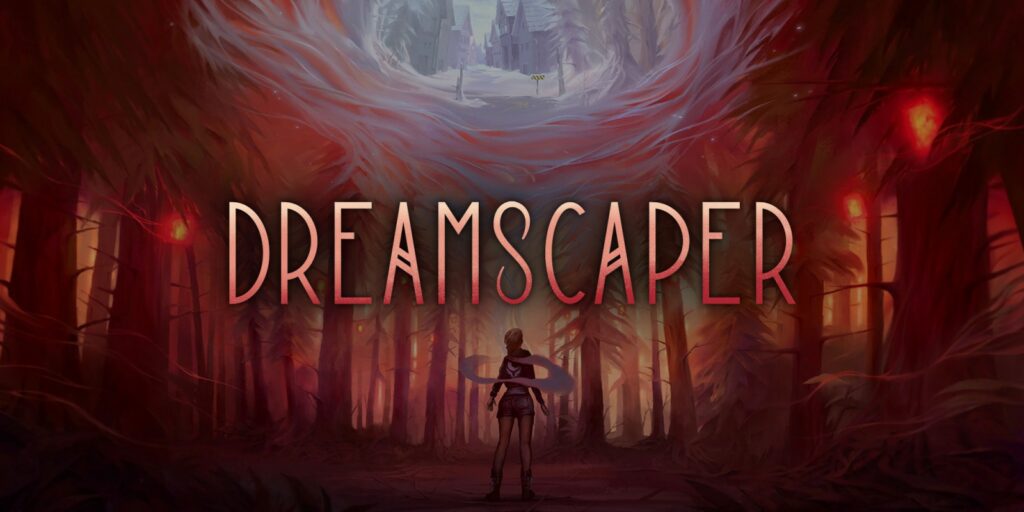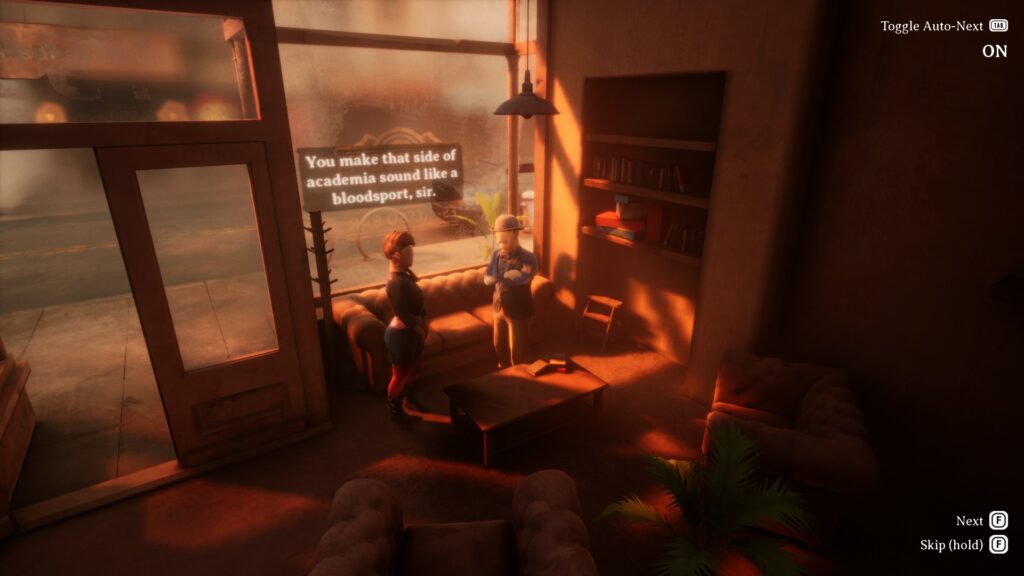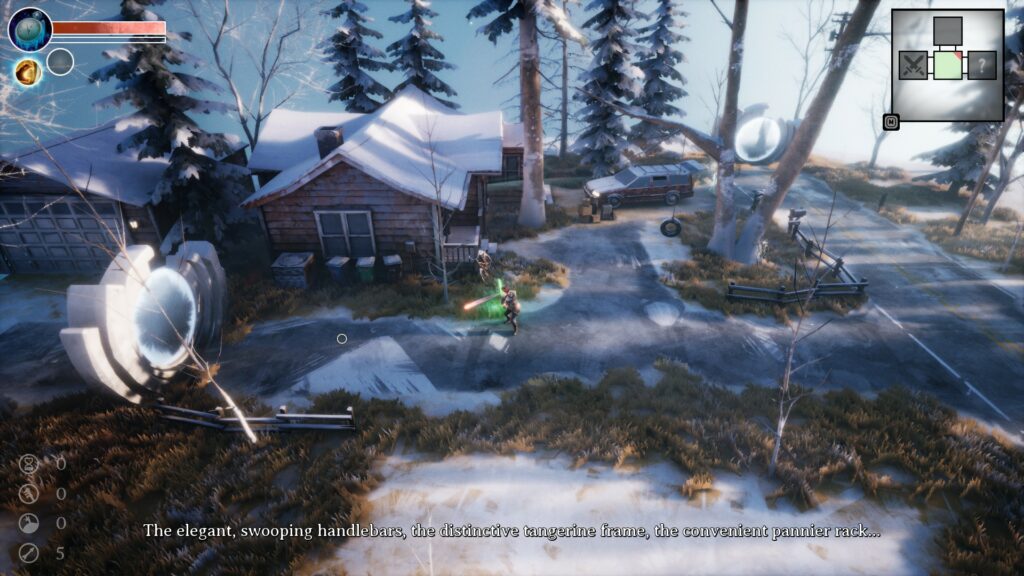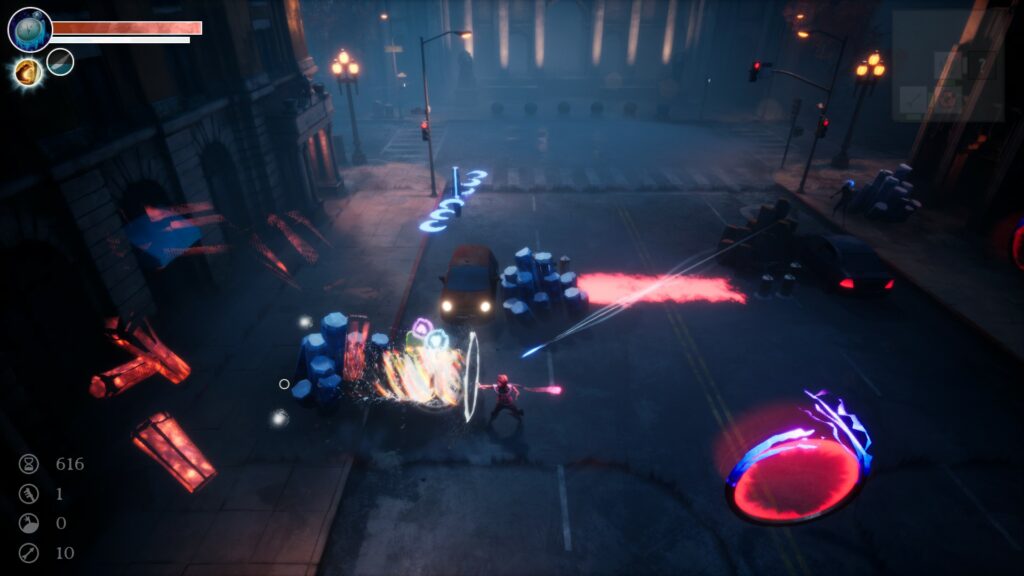
Developer: Afterburner Studios
Publisher:
Freedom! Games, Maple Whispering Limited
Platform: PC (Steam), Nintendo Switch
Tested On: PC
Dreamscaper – Preview
Characters are one of the most important parts of a game; they can make or break one. Roguelikes and roguelites don’t tend to have developed stories, thus not having to worry about developing characters, for better or worse. Surprisingly, Dreamscaper twists these conceptions, making it very unique.
Despite what was said in the introduction, it is not the story that Dreamscaper tampers with but the character interactions. The overall narrative is quite simple, just dealing with Cassidy, the game’s protagonist, and how she’s adapting to the big city.
What the game does mess with are the characters and their interactions with Cassidy, Every single one of the cast has a unique personality and story, making for charming interactions any player will be delighted with. All dialogues convey the character’s feelings and make them feel alive instead of running gags or cardboard cutouts.
It is also important to mention the game also deals with themes of mental health, talking about Cassidy’s and the other character’s issues and insecurities. A good example could be Bruce, the history teacher, who wonders if he is a boring person as he thinks he is, or Carl and his burnout.
Cassidy’s story and thoughts are also conveyed through the insights found in the dream world. Upon interacting with certain objects, Cassidy will remember stories from her past and talk about them, fleshing out her character organically.
The themes and atmosphere of the game are only further reinforced through the visuals and music. All areas during Cassidy’s slumber appear dreamlike and somewhat trippy, accompanied by the gorgeous soundtrack. That said, while all areas have “rooms” with different things to show, there tends to be some reuse, making several of these rooms have identical backgrounds to one another despite enemy and hazard differences. The SFX are generally good, but there’s nothing out of the ordinary worth mentioning.
All designs are also quite unique, with characters being extremely expressive despite the mannequin-like look. This applies to enemies as well, which look completely different from the characters while still fitting right in.
As previously mentioned, Dreamscaper is a Roguelite, due to the meta progression present, though it is arguably a light one. The main mechanic the game features is the combination of the waking and dream worlds; while Cassidy sleeps she accumulates time to be awake, which can then be used to deepen the bonds with other characters, unlocking items.
What is unlocked here can be classified into three types: Equipment, Keepsakes and Influences. Equipment is the usual, weapons, special attacks, etc; Keepsakes are what is usually known as relics, items that provide stats or effects and lastly Influences are permanent boosts. Each of the characters has a different influence effect, ranging from critical strike to defence. The stats granted by these influences also grow as the relationships develop; a player can choose to go all in to crit and max out the bond with Bruce first.
The dream world plays out as a standard hack and slash third-person roguelike, pitching players against rooms full of monsters to beat and a boss at the end of each level. There are also puzzle rooms included, which grant a relic; these rooms are not particularly challenging and have no limit, making them a gift in exchange for a slight effort. These relics can also be found in random rooms in the level, along with new equipment.
This equipment is split into several categories, weapons, defence, and special attacks. Weapons can be melee or ranged; the latter taking ammunition to shoot and both having a lot of different types to choose from. Defence is split in both shield and movement; the first for blocking and the second for dodging. Lastly, the special attacks called Lucid Attacks and Lucid Awakening. These special attacks are all different from each other; Lucid Attacks have a simple but interesting effect, limited by cooldowns. On the other hand, Lucid Awakening draws from Lucid, basically mana, for a powerful effect such as slowing down time.
Combat heavily relies on reflexes and timing, in a style heavily reminiscent of Curse of the Dead Gods. For players more inclined towards risk, blocking is a powerful tool; timing a block right before a hit leads to a powerful counter-attack. By relying on combos, counters and dashes, the player must keep enemies at bay. A qualm to be had with the game is how spongey enemies tend to be, soaking up huge amounts of damage.
Conclusion
Dreamscaper is a very good game with incredible ideas and execution. While some things are still somewhat rough around the edges, such as the enemy health, it is shaping up to be astonishing. For its current price of $20/€18,49, it is more than worthy despite being in Early Access. The developers are also clearly invested in the project and tend to make it as good as possible, taking huge amounts of feedback from the community.
Personal Opinion
“I loved the time I spent with Dreamscaper, it is a joy to play the game thanks to the smooth and responsive controls. It also helped a lot how much I enjoy well-written characters, which this game definitely has. As mentioned in the review the pacing is somewhat broken between fight levels if the player chooses to stay awake. While it doesn’t take too long, the calm conversations are a huge contrast in respect to the hack and slash gameplay. Perhaps a way to accumulate more time while playing more could be worked in, so as not to force players to just skip the waking sections. Regardless, I’ll be waiting for the full release of this game with excitement.”
Dreamscaper - Preview,









No Comments